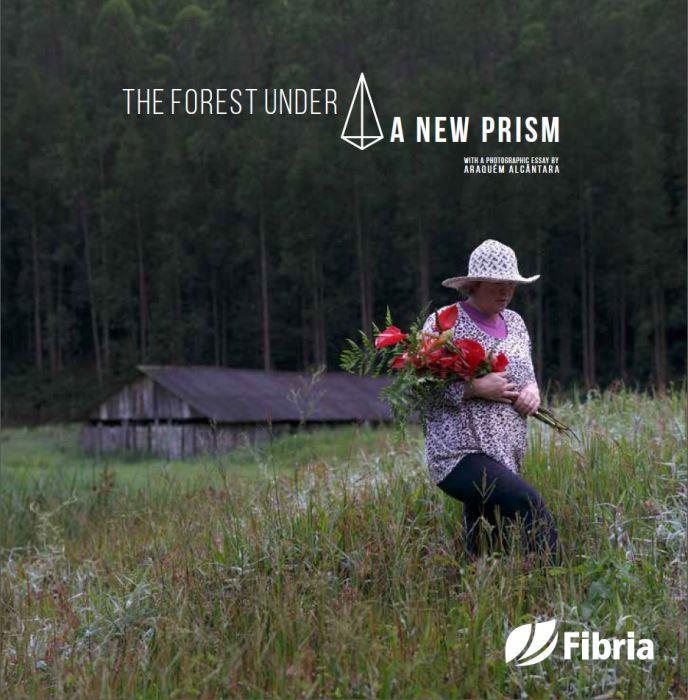Fibria takes to London a photography and virtual-reality video exhibition on planted forests in Brazil

Fibria, a Brazilian company that is the world’s leading producer of eucalyptus pulp from planted forests, presents in London the exhibition “The Forest Under a New Prism,” which features photos from Araquém Alcântara, one of Brazil’s most important nature photographers. The photo exhibition is part of London Pulp Week 2017, an event that brings together the world’s leading pulp manufacturers.
The Brazilian Atlantic Forest and its birds, mammals, traditional communities, and small farmers are some of the stars of the exhibition, which presents a new way of looking at planted forests. The exhibition also features 360° virtual reality (VR) videos, in which visitors embark on a virtual experience to accompany, in a nearly lifelike immersion, activities such as the removal of honeycombs from eucalyptus forests, the planting of native Atlantic Forest saplings and the production of food by family farmers. Check the video below.
“The project gave us insight into the strength of nature and the communities forming this region of Brazil. It was a great opportunity to portray the rivers, fauna and flora that form scenes of such great beauty,” said photographer Araquém Alcântara.
“The project shows how the land under Fibria’s influence is connected and maintains a systemic link among regions, traditional communities, the company and the environment. This connection values diversity, dialogue, building together, partnership and plurality” said Fibria’s Sustainability, Communications and Corporate Affairs Officer, Maria Luiza Pinto e Paiva.
Shared value and social impact
The photo exhibition took place at the Corinthia Hotel, during London Pulp Week 2017, where Fibria will sponsored a lecture by Dane Smith, director of FSG – a consulting firm founded by Michael Porter and Mark Kramer, two Harvard University professors and scholars studying the relationship between the economy and social impact –, which conducted an analysis of Fibria’s sustainability actions and how they share value with society.
According to the consulting firm, Fibria’s efforts to incorporate its social and environmental investments into its business strategy are part of a trend by leading global companies, which are starting to recognize the connection between their financial success and society’s prosperity. According to FSG, this correlation, known as “shared value,” boosts a company’s competitiveness while improving the economic, social and environmental conditions of local communities.
Over its history, Fibria has developed many programs and initiatives to create value shared with society. One such example is the Rural Land Development Program (PDRT), which supports the development of local farmer associations to foster local development. In 2009, wood theft represented for Fibria a loss of 650,000 cubic meters of eucalyptus (around R$50 million) and raised tensions with neighboring communities, where a dearth of viable economic alternatives contributed to the activity.
Farmer Cláudio Olímpio, who lives in Espora Gato, Bahia, is currently a beneficiary of the PDRT. “We said ‘bring back the work of our grandparents, farming.’” Thanks to the program, “we’ve abandoned making charcoal and started working the land,” said Olímpio.
Just like for the local community, the results for Fibria are also clear. In 2016, the PDRT was supporting 50 communities and wood theft had fallen by 90% compared to 2009. Today, PDRT benefits some 5,000 families, whose average monthly income is R$4,700.
Another of the company’s value-sharing program is Forest Savings, which helps farmers grow eucalyptus on their properties as a way to diversify their crops and sources of income. Many local residents have seen major transformations in their lives, such as Florisberto José dos Santos, from the Itaúnas community in Conceição da Barra, Espírito Santo. “Thanks to eucalyptus, today I have a house and have expanded my property,” he said.
The Forest Savings Program also plays an important role in environmental conservation and recovery. Fibria requires beneficiaries to comply with the Brazilian Forest Code on their entire properties. It also provides technical support on sustainable farming techniques that even exceed legal requirements.
In addition to increasing its social and environmental impact, the Program has become an important source for supplying Fibria’s wood needs for pulp production. Although the Forest Savings began its work with a target of meeting 5% of the wood needs of the Aracruz plant, its contribution has grown to supplying on average 20% of its consumption. Today, 2,000 families benefit from the Program. In 2016, Fibria saved more than R$100 million by interacting with farmers across its supply chain.
“We saw an opportunity to restructure the company’s relationship with the community. We talked, compromised and developed a solution together. We’re very proud of what we’ve achieved with our shared-value initiatives,” said Fibria CEO Marcelo Castelli. “We were able to improve the lives of hundreds of families and also the environment, while also becoming a more profitable company. And I’m certain that this is just the beginning. There’s still much to be done,” he added.
“Brazilian and global companies can learn a lot from Fibria’s example,” said Dane Smith, director of FSG. “There are innumerous opportunities for companies to leverage their competitiveness and profitability by seeking solutions to solve problems like hunger, poverty, low-quality education and others. These are shared-value strategies and companies must learn how to develop them,” summed up Smith.
COMENTÁRIOS:
Destaques
- Escola Aberje leva comunicadores para Amazônia em expedição imersiva
- Encontro de líderes debate responsabilidade do setor empresarial e papel da comunicação na COP30
- Aberje realiza reunião presencial com Comitês de Estudos Temáticos em São Paulo
- A comunicação é forte em mercados em que as associações são fortes
- Aberje participa do painel de entidades no 19º Congresso da Abraji
ARTIGOS E COLUNAS
Marcos Santos Maratona da vidaMônica Brissac Thought Leadership: marca pessoal x reputação corporativaLetícia Tavares Liderança comunicadora: um tema sempre atualHamilton dos Santos Comunicação é estratégica na economia contemporâneaCarlos Parente Um salto ornamental para mergulhar no pires




























